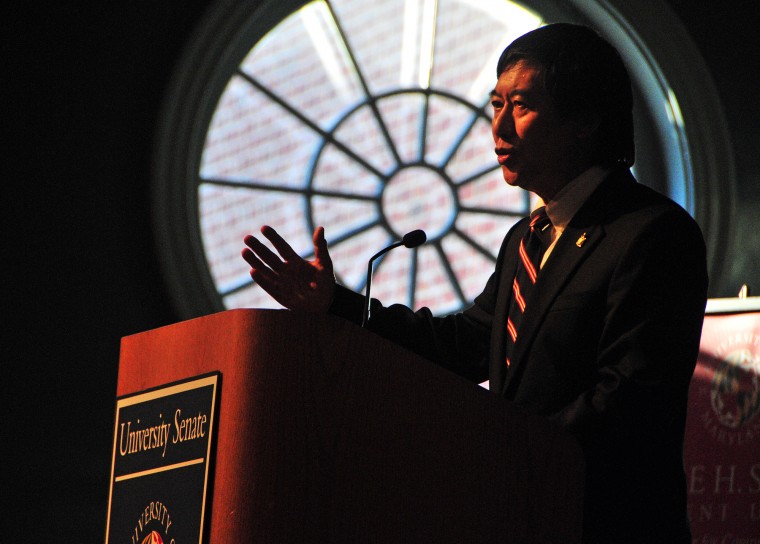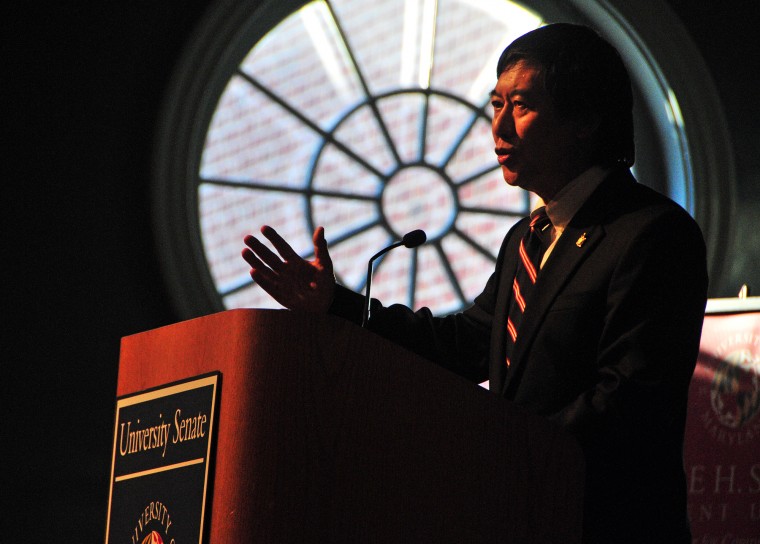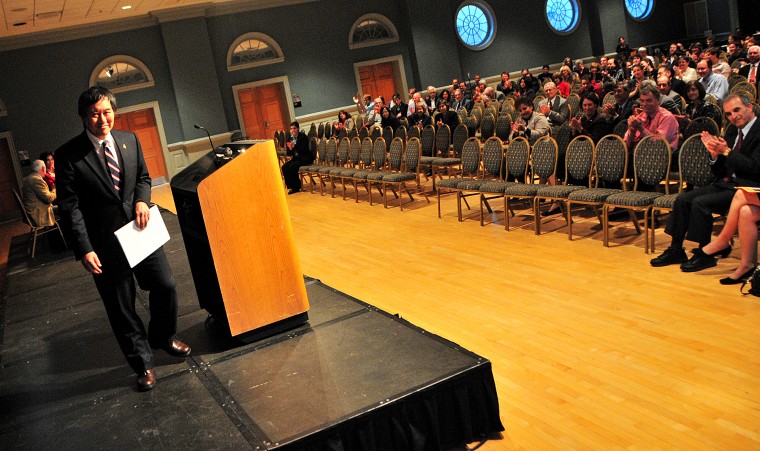After three months of listening, university President Wallace Loh spoke his vision for the future of the university at yesterday’s senate meeting, pledging to continue on a path of excellence — but not necessarily the same path set by his predecessors.
Addressing the University Senate in Stamp Student Union’s Colony Ballroom on his 11th day on the job, Loh touched on several hot-button issues, including the alignment of the Purple Line, how this university treats arts and humanities programs, increasing undergraduate enrollment rates and ending furloughs. Loh also pledged to continue implementation of the university’s Strategic Plan, which set goals and benchmarks for the university throughout the next decade and was lauded by former university President Dan Mote as its most important guiding document.
“My pledge to you today, my unwavering commitment, is continued excellence in everything that we do,” Loh said in his speech yesterday. “We will follow a bright and distant star, drawn ever upwards and onwards, knowing that transformative excellence is a journey, not a destination.”
But along with this commitment, Loh was quick to point out that not all parts of the Strategic Plan are “engraved in concrete.”
“Every plan is subject to some minor adjustments and modifications in light of changing circumstances,” he said.
One of those areas, Loh said, is his commitment to increasing the undergraduate enrollment rate by 4,000 students by 2020 — a goal in line with the Board of Regents’ target to increase University System of Maryland enrollment by 40,000 students but one in stark contrast to its aim to decrease enrollment at this institution.
Loh pointed out that many of these new students won’t be traditional freshmen and the university will have to utilize surrounding regional centers, such as the Universities at Shady Grove and local community colleges, to help bring in the influx of undergraduates.
“In order to reach [the board’s goal], we have to expand capacity,” Loh said. “It is very important to know the demand for a post-secondary education in Maryland is soaring.”
The new president also vowed a commitment to furthering arts and humanities, an area of university academia that many faculty members said has been shadowed by the prestige of the hard sciences’ research and funding.
But Loh noted the 21st century presents issues — such as climate change, sustainability, poverty and global health — that impact all academic disciplines.
“In this global economy, our graduates must not only have technical knowledge of skills,” he said. “In addition, they must have an understanding of languages, cultures, of history and of economics.”
Loh’s specific inclusion of the humanities in his first senate address was well received by several senators, including English professor Martha Nell Smith. Nell Smith drafted a letter last spring to public policy school Dean Don Kettl, who chaired the search committee to find the new president, requesting special consideration be taken to find a new leader with an appreciation of the humanities. More than 60 other faculty members signed the letter.
“I really like that he pledged a commitment to the humanities,” said Nell Smith, who is a member of the Senate Executive Committee, the senate’s most powerful committee. “I encourage him to continue that support, and I’ll help him in any way I can to do so.”
And although many senators expressed appreciation for that message, Loh’s pledge to fight furloughs earned him resounding applause from the audience.
After two years of no salary increases, increasing staff layoffs and three years of furlough days, Loh recognized that morale among faculty and staff is low and many talented members are choosing to leave the university for other jobs.
“Our people are our most important asset,” Loh said. “Retaining, supporting and recruiting top faculty and staff will be my highest priority, which means I will fight any further furloughs. I will fight for this campus.”
Loh also took the opportunity to address the issue of the Purple Line, a state-proposed 16-mile rail system that would connect Bethesda to New Carrollton and run through the campus. Although the issue has divided administrators, students and other members of the university community for years, Loh pledged to deliver a decisive decision on the line’s alignment this year.
“The governor has said he does not want to speak about this issue until after the election,” he said. “Well the election is over. And the time has come to make a decision or move forward in the process.”
Loh delivered similar commitments — such as ensuring East Campus development materializes — without concretely laying a plan of action.
Undergraduate senator Irina Alexander praised Loh’s pledge to an honest administration that works with students and operates more as a democracy than a top-down dictatorship.
“I’m very impressed,” she said. “I thought it was great. I’m impressed with his leadership style and commitment to transparency and listening to student concerns.”
redding at umdbk dot com
President Loh laid out his ambitions in his first State of the Campus address at yesterday’s University Senate meeting.
University President Wallace Loh exits the stage after his State of the Campus address, in which he emphasized the importance of a close-knit university community.





